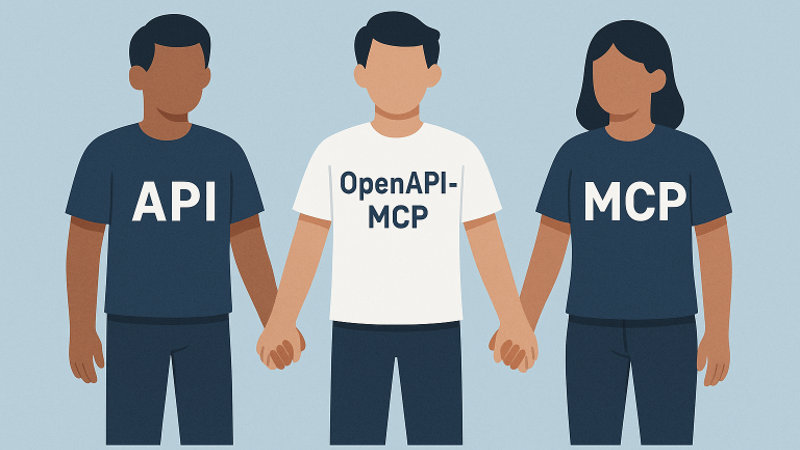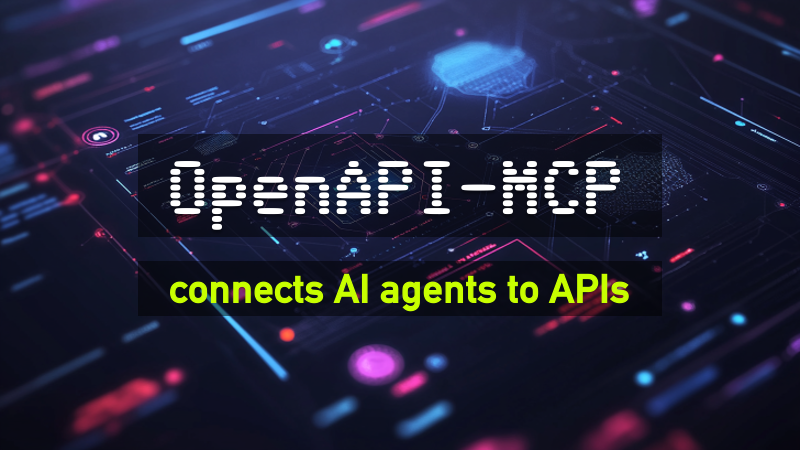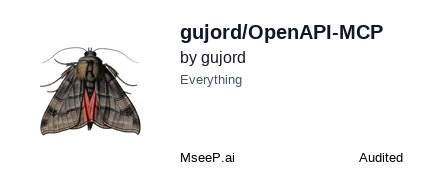# OpenAPI to Model Context Protocol (MCP)
[](LICENSE)




**The OpenAPI-MCP proxy translates OpenAPI specs into MCP tools, enabling AI agents to access external APIs without custom wrappers!**

## Bridge the gap between AI agents and external APIs
The OpenAPI to Model Context Protocol (MCP) proxy server bridges the gap between AI agents and external APIs by **dynamically translating** OpenAPI specifications into standardized **MCP tools**, **resources**, and **prompts**. This simplifies integration by eliminating the need for custom API wrappers.
Built with **FastMCP** following official MCP patterns and best practices, the server provides:
- ✅ **Official FastMCP Integration** - Uses the latest FastMCP framework for optimal performance
- ✅ **Proper MCP Transport** - Supports stdio, SSE, and streamable HTTP transports
- ✅ **Modular Architecture** - Clean separation of concerns with dependency injection
- ✅ **Production Ready** - Robust error handling, comprehensive logging, and type safety
- **Repository:** [https://github.com/gujord/OpenAPI-MCP](https://github.com/gujord/OpenAPI-MCP)
---
If you find it useful, please give it a ⭐ on GitHub!
---
## Key Features
### Core Functionality
- **FastMCP Transport:** Optimized for `stdio`, working out-of-the-box with popular LLM orchestrators.
- **OpenAPI Integration:** Parses and registers OpenAPI operations as callable tools.
- **Resource Registration:** Automatically converts OpenAPI component schemas into resource objects with defined URIs.
- **Prompt Generation:** Generates contextual prompts based on API operations to guide LLMs in using the API.
- **Dual Authentication:** Supports both OAuth2 Client Credentials flow and username/password authentication with automatic token caching.
- **MCP HTTP Transport:** Official MCP-compliant HTTP streaming transport with JSON-RPC 2.0 over SSE.
- **Server-Sent Events (SSE):** Legacy streaming support (deprecated - use MCP HTTP transport).
- **JSON-RPC 2.0 Support:** Fully compliant request/response structure.
### Advanced Features
- **Modular Architecture:** Clean separation of concerns with dedicated modules for authentication, request handling, and tool generation.
- **Robust Error Handling:** Comprehensive exception hierarchy with proper JSON-RPC error codes and structured error responses.
- **Auto Metadata:** Derives tool names, summaries, and schemas from the OpenAPI specification.
- **Sanitized Tool Names:** Ensures compatibility with MCP name constraints.
- **Flexible Parameter Parsing:** Supports query strings, JSON, and comma-separated formats with intelligent type conversion.
- **Enhanced Parameter Handling:** Automatically converts parameters to correct data types with validation.
- **Extended Tool Metadata:** Includes detailed parameter information, response schemas, and API categorization.
- **CRUD Operation Detection:** Automatically identifies and generates example prompts for Create, Read, Update, Delete operations.
- **MCP-Compliant Streaming:** Official MCP HTTP transport for real-time streaming with proper session management.
### Developer Experience
- **Configuration Management:** Centralized environment variable handling with validation and defaults.
- **Comprehensive Logging:** Structured logging with appropriate levels for debugging and monitoring.
- **Type Safety:** Full type hints and validation throughout the codebase.
- **Extensible Design:** Factory patterns and dependency injection for easy customization and testing.
## 🚀 Quick Start
### Installation
```bash
git clone https://github.com/gujord/OpenAPI-MCP.git
cd OpenAPI-MCP
python3.12 -m venv venv
source venv/bin/activate # On Windows: venv\Scripts\activate
pip install -r requirements.txt
```
### 🎯 Simple Usage
**Option 1: Quick Test (Norwegian Weather API)**
```bash
# Activate virtual environment
source venv/bin/activate
# Run weather API server
OPENAPI_URL="https://api.met.no/weatherapi/locationforecast/2.0/swagger" \
SERVER_NAME="weather" \
python src/fastmcp_server.py
```
**Option 2: HTTP Transport (Recommended for Claude Desktop)**
```bash
# Start weather API with HTTP transport
source venv/bin/activate && \
OPENAPI_URL="https://api.met.no/weatherapi/locationforecast/2.0/swagger" \
SERVER_NAME="weather" \
MCP_HTTP_ENABLED="true" \
MCP_HTTP_PORT="8001" \
python src/fastmcp_server.py
```
### 🔗 Claude Desktop Setup
**1. Copy the provided configuration:**
```bash
cp claude_desktop_config.json ~/Library/Application\ Support/Claude/claude_desktop_config.json
```
**2. Start the weather server:**
```bash
source venv/bin/activate && \
OPENAPI_URL="https://api.met.no/weatherapi/locationforecast/2.0/swagger" \
SERVER_NAME="weather" \
MCP_HTTP_ENABLED="true" \
MCP_HTTP_PORT="8001" \
python src/fastmcp_server.py
```
**3. Test in Claude Desktop:**
- Ask: *"What's the weather in Oslo tomorrow?"*
- Claude will use the `weather_get__compact` tool automatically!
### 🌐 Multiple API Servers
Run multiple OpenAPI services simultaneously:
```bash
# Terminal 1: Weather API
source venv/bin/activate && \
OPENAPI_URL="https://api.met.no/weatherapi/locationforecast/2.0/swagger" \
SERVER_NAME="weather" \
MCP_HTTP_ENABLED="true" \
MCP_HTTP_PORT="8001" \
python src/fastmcp_server.py
# Terminal 2: Petstore API
source venv/bin/activate && \
OPENAPI_URL="https://petstore3.swagger.io/api/v3/openapi.json" \
SERVER_NAME="petstore" \
MCP_HTTP_ENABLED="true" \
MCP_HTTP_PORT="8002" \
python src/fastmcp_server.py
```
### 🐳 Docker Deployment
**Quick start with Docker:**
```bash
# Start all services (weather + petstore)
./docker-start.sh
# Or manually
docker-compose up --build -d
```
This automatically runs:
- Weather API on port 8001
- Petstore API on port 8002
## ⚙️ Advanced Configuration
### Claude Desktop / Cursor / Windsurf
**HTTP Transport (Recommended):**
Use the provided configuration file:
```bash
cp claude_desktop_config.json ~/Library/Application\ Support/Claude/claude_desktop_config.json
```
Or create manually:
```json
{
"mcpServers": {
"weather": {
"command": "npx",
"args": ["mcp-remote", "http://127.0.0.1:8001/sse"]
},
"petstore": {
"command": "npx",
"args": ["mcp-remote", "http://127.0.0.1:8002/sse"]
}
}
}
```
**Stdio Transport (Alternative):**
```json
{
"mcpServers": {
"weather": {
"command": "/full/path/to/OpenAPI-MCP/venv/bin/python",
"args": ["/full/path/to/OpenAPI-MCP/src/fastmcp_server.py"],
"env": {
"SERVER_NAME": "weather",
"OPENAPI_URL": "https://api.met.no/weatherapi/locationforecast/2.0/swagger"
},
"transport": "stdio"
}
}
}
```
> **Note:** Replace `/full/path/to/OpenAPI-MCP` with your actual installation path.
#### With Local Spec and Custom Headers
```json
{
"mcpServers": {
"local_api": {
"command": "/full/path/to/OpenAPI-MCP/venv/bin/python",
"args": ["/full/path/to/OpenAPI-MCP/src/fastmcp_server.py"],
"env": {
"SERVER_NAME": "local_api",
"OPENAPI_URL": "./specs/my-api.yaml",
"MCP_AUTH_HEADERS": "{\"X-API-Key\": \"your-key-here\"}"
},
"transport": "stdio"
}
}
}
```
#### With Username/Password Authentication
```json
{
"mcpServers": {
"secure_api": {
"command": "full_path_to_openapi_mcp/venv/bin/python",
"args": ["full_path_to_openapi_mcp/src/server.py"],
"env": {
"SERVER_NAME": "secure_api",
"OPENAPI_URL": "https://api.example.com/openapi.json",
"API_USERNAME": "your_username",
"API_PASSWORD": "your_password"
},
"transport": "stdio"
}
}
}
```
#### With OAuth2 Authentication
```json
{
"mcpServers": {
"oauth_api": {
"command": "full_path_to_openapi_mcp/venv/bin/python",
"args": ["full_path_to_openapi_mcp/src/server.py"],
"env": {
"SERVER_NAME": "oauth_api",
"OPENAPI_URL": "https://api.example.com/openapi.json",
"OAUTH_CLIENT_ID": "your_client_id",
"OAUTH_CLIENT_SECRET": "your_client_secret",
"OAUTH_TOKEN_URL": "https://api.example.com/oauth/token"
},
"transport": "stdio"
}
}
}
```
#### Multiple API Servers with MCP HTTP Transport
Configure multiple OpenAPI services to run simultaneously:
```json
{
"mcpServers": {
"weather": {
"command": "npx",
"args": [
"mcp-remote",
"http://127.0.0.1:8001/sse"
]
},
"petstore": {
"command": "npx",
"args": [
"mcp-remote",
"http://127.0.0.1:8002/sse"
]
}
}
}
```
This configuration gives Claude access to both weather data AND petstore API tools simultaneously, with clear tool naming like `weather_get__compact` and `petstore_addPet`.
#### Single API Server with MCP HTTP Transport
For a single API service:
**Standard SSE Configuration:**
```json
{
"mcpServers": {
"openapi_service": {
"command": "npx",
"args": [
"mcp-remote",
"http://127.0.0.1:8001/sse"
]
}
}
}
```
**Streamable HTTP Configuration:**
```json
{
"mcpServers": {
"openapi_service": {
"command": "npx",
"args": [
"mcp-remote",
"http://127.0.0.1:8001/mcp"
]
}
}
}
```
**With Debugging (for development):**
```json
{
"mcpServers": {
"openapi_service": {
"command": "npx",
"args": [
"mcp-remote",
"http://127.0.0.1:8001/sse",
"--debug"
]
}
}
}
```
**With Custom Transport Strategy:**
```json
{
"mcpServers": {
"openapi_service": {
"command": "npx",
"args": [
"mcp-remote",
"http://127.0.0.1:8001/mcp",
"--transport",
"streamable-http"
]
}
}
}
```
#### With Legacy SSE Streaming (Deprecated)
```json
{
"mcpServers": {
"streaming_api": {
"command": "full_path_to_openapi_mcp/venv/bin/python",
"args": ["full_path_to_openapi_mcp/src/server.py"],
"env": {
"SERVER_NAME": "streaming_api",
"OPENAPI_URL": "https://api.example.com/openapi.json",
"SSE_ENABLED": "true",
"SSE_HOST": "127.0.0.1",
"SSE_PORT": "8001"
},
"transport": "stdio"
}
}
}
```
Apply this configuration to the following files:
- Cursor: `~/.cursor/mcp.json`
- Windsurf: `~/.codeium/windsurf/mcp_config.json`
- Claude Desktop: `~/Library/Application Support/Claude/claude_desktop_config.json`
> Replace `full_path_to_openapi_mcp` with your actual installation path.
### Quick Setup for Multiple APIs
Copy the provided example configuration:
```bash
cp claude_desktop_config.json ~/Library/Application\ Support/Claude/claude_desktop_config.json
```
Start both services:
```bash
# Terminal 1
source venv/bin/activate && \
OPENAPI_URL="https://api.met.no/weatherapi/locationforecast/2.0/swagger" \
SERVER_NAME="weather" \
MCP_HTTP_ENABLED="true" \
MCP_HTTP_PORT="8001" \
python src/fastmcp_server.py
# Terminal 2
source venv/bin/activate && \
OPENAPI_URL="https://petstore3.swagger.io/api/v3/openapi.json" \
SERVER_NAME="petstore" \
MCP_HTTP_ENABLED="true" \
MCP_HTTP_PORT="8002" \
python src/fastmcp_server.py
```
Result: Claude gets access to both weather and petstore APIs with prefixed tool names.
### Environment Configuration
#### Core Configuration
| Variable | Description | Required | Default |
|-----------------------|--------------------------------------|----------|------------------------|
| `OPENAPI_URL` | URL or local file path to OpenAPI specification | Yes | - |
| `SERVER_NAME` | MCP server name | No | `openapi_proxy_server` |
#### OAuth2 Authentication
| Variable | Description | Required | Default |
|-----------------------|--------------------------------------|----------|------------------------|
| `OAUTH_CLIENT_ID` | OAuth client ID | No | - |
| `OAUTH_CLIENT_SECRET` | OAuth client secret | No | - |
| `OAUTH_TOKEN_URL` | OAuth token endpoint URL | No | - |
| `OAUTH_SCOPE` | OAuth scope | No | `api` |
#### Username/Password Authentication
| Variable | Description | Required | Default |
|-----------------------|--------------------------------------|----------|------------------------|
| `API_USERNAME` | API username for authentication | No | - |
| `API_PASSWORD` | API password for authentication | No | - |
| `API_LOGIN_ENDPOINT` | Login endpoint URL | No | Auto-detected |
#### Custom Authentication Headers
| Variable | Description | Required | Default |
|-----------------------|--------------------------------------|----------|------------------------|
| `MCP_AUTH_HEADERS` | Custom authentication headers (JSON or key=value format) | No | - |
#### MCP HTTP Transport (Recommended)
| Variable | Description | Required | Default |
|-----------------------|--------------------------------------|----------|------------------------|
| `MCP_HTTP_ENABLED` | Enable MCP HTTP transport | No | `false` |
| `MCP_HTTP_HOST` | MCP HTTP server host | No | `127.0.0.1` |
| `MCP_HTTP_PORT` | MCP HTTP server port | No | `8000` |
| `MCP_CORS_ORIGINS` | CORS origins (comma-separated) | No | `*` |
| `MCP_MESSAGE_SIZE_LIMIT` | Message size limit | No | `4mb` |
| `MCP_BATCH_TIMEOUT` | Batch timeout in seconds | No | `30` |
| `MCP_SESSION_TIMEOUT` | Session timeout in seconds | No | `3600` |
#### Legacy SSE Support (Deprecated)
| Variable | Description | Required | Default |
|-----------------------|--------------------------------------|----------|------------------------|
| `SSE_ENABLED` | Enable SSE streaming support | No | `false` |
| `SSE_HOST` | SSE server host | No | `127.0.0.1` |
| `SSE_PORT` | SSE server port | No | `8000` |
## 📁 Loading Local OpenAPI Specifications
You can now load OpenAPI specs from your local filesystem instead of requiring remote URLs:
### JSON Format
```bash
source venv/bin/activate
OPENAPI_URL="./specs/my-api.json" \
SERVER_NAME="local_api" \
python src/fastmcp_server.py
```
### YAML Format
```bash
source venv/bin/activate
OPENAPI_URL="../shared/api.yaml" \
SERVER_NAME="local_api" \
python src/fastmcp_server.py
```
### Absolute Path
```bash
source venv/bin/activate
OPENAPI_URL="/Users/myuser/projects/api-spec.json" \
SERVER_NAME="local_api" \
python src/fastmcp_server.py
```
### Supported Formats
- **JSON files**: `.json` extension
- **YAML files**: `.yaml` or `.yml` extension
- **Relative paths**: `./path/to/spec.yaml`, `../spec.json`
- **Absolute paths**: `/full/path/to/spec.yaml`
## 🔑 API Key and Custom Headers
Support for APIs requiring custom headers (API keys, tokens, etc.):
### Using JSON Format
```bash
source venv/bin/activate
MCP_AUTH_HEADERS='{"X-API-Key": "your-api-key", "X-Client-ID": "client123"}' \
OPENAPI_URL="https://api.example.com/openapi.json" \
SERVER_NAME="custom_api" \
python src/fastmcp_server.py
```
### Using Simple Format
```bash
source venv/bin/activate
MCP_AUTH_HEADERS='X-API-Key=your-api-key,X-Client-ID=client123' \
OPENAPI_URL="https://api.example.com/openapi.json" \
SERVER_NAME="custom_api" \
python src/fastmcp_server.py
```
### Common API Key Patterns
- **RapidAPI**: `MCP_AUTH_HEADERS='{"X-RapidAPI-Key": "your-key"}'`
- **Custom Bearer**: `MCP_AUTH_HEADERS='{"Authorization": "Bearer custom-token"}'`
- **Multiple Headers**: `MCP_AUTH_HEADERS='{"X-API-Key": "key", "X-API-Secret": "secret"}'`
### Local Spec + Custom Headers
Combine both features for development:
```bash
source venv/bin/activate
OPENAPI_URL="./test/fixtures/api.json" \
MCP_AUTH_HEADERS='{"X-API-Key": "dev-key"}' \
SERVER_NAME="dev_api" \
python src/fastmcp_server.py
```
## 🛠️ Examples & Use Cases
### Norwegian Weather API
Test with real weather data (no authentication required):
```bash
# Start weather server
source venv/bin/activate && \
OPENAPI_URL="https://api.met.no/weatherapi/locationforecast/2.0/swagger" \
SERVER_NAME="weather" \
MCP_HTTP_ENABLED="true" \
MCP_HTTP_PORT="8001" \
python src/fastmcp_server.py
```
**Available tools:**
- `weather_get__compact` - Weather forecast for coordinates
- `weather_get__complete` - Detailed weather forecast
- `weather_get__status` - Server status
**Example usage in Claude:**
- *"What's the weather in Oslo tomorrow?"* → Uses lat=59.9139, lon=10.7522
- *"Show me detailed weather for Bergen"* → Uses lat=60.3913, lon=5.3221
### Pet Store API
Test with Swagger's demo API:
```bash
# Start petstore server
source venv/bin/activate && \
OPENAPI_URL="https://petstore3.swagger.io/api/v3/openapi.json" \
SERVER_NAME="petstore" \
MCP_HTTP_ENABLED="true" \
MCP_HTTP_PORT="8002" \
python src/fastmcp_server.py
```
**Available tools:**
- `petstore_addPet` - Add a new pet to the store
- `petstore_findPetsByStatus` - Find pets by status
- `petstore_getPetById` - Find pet by ID
## 🏗️ Architecture
### FastMCP-Based Design
```
src/
├── fastmcp_server.py # FastMCP-based main server (recommended)
├── server.py # Legacy MCP server (fallback)
├── config.py # Configuration management
├── auth.py # OAuth authentication handling
├── openapi_loader.py # OpenAPI spec loading and parsing
├── request_handler.py # Request preparation and validation
├── schema_converter.py # Schema conversion utilities
├── exceptions.py # Custom exception hierarchy
└── __init__.py # Package initialization
```
### Key Features
✅ **FastMCP Integration** - Uses latest FastMCP framework
✅ **Automatic Tool Registration** - Converts OpenAPI operations to MCP tools
✅ **Multi-Transport Support** - stdio, HTTP, SSE
✅ **Parameter Validation** - Type conversion and validation
✅ **Error Handling** - Comprehensive JSON-RPC error responses
✅ **Authentication** - OAuth2 and username/password support
## How It Works
1. **Configuration Loading:** Validates environment variables and server configuration.
2. **OpenAPI Spec Loading:** Fetches and parses OpenAPI specifications with comprehensive error handling.
3. **Component Initialization:** Sets up modular components with dependency injection.
4. **Tool Registration:** Dynamically creates MCP tools from OpenAPI operations with full metadata.
5. **Resource Registration:** Converts OpenAPI schemas into MCP resources with proper URIs.
6. **Prompt Generation:** Creates contextual usage prompts and CRUD operation examples.
7. **Authentication:** Handles both OAuth2 and username/password authentication with token caching and automatic renewal.
8. **Request Processing:** Advanced parameter parsing, type conversion, and validation.
9. **Error Handling:** Comprehensive exception handling with structured error responses.
```mermaid
sequenceDiagram
participant LLM as LLM (Claude/GPT)
participant MCP as OpenAPI-MCP Proxy
participant API as External API
Note over LLM, API: Communication Process
LLM->>MCP: 1. Initialize (initialize)
MCP-->>LLM: Metadata, tools, resources, and prompts
LLM->>MCP: 2. Request tools (tools_list)
MCP-->>LLM: Detailed list of tools, resources, and prompts
LLM->>MCP: 3. Call tool (tools_call)
alt With OAuth2
MCP->>API: Request OAuth2 token
API-->>MCP: Access Token
end
MCP->>API: 4. Execute API call with proper formatting
API-->>MCP: 5. API response (JSON)
alt Type Conversion
MCP->>MCP: 6. Convert parameters to correct data types
end
MCP-->>LLM: 7. Formatted response from API
alt Dry Run Mode
LLM->>MCP: Call with dry_run=true
MCP-->>LLM: Display request information without executing call
end
```
## Resources & Prompts
The server automatically generates comprehensive metadata to enhance AI integration:
### Resources
- **Schema-based Resources:** Automatically derived from OpenAPI component schemas
- **Structured URIs:** Resources are registered with consistent URIs (e.g., `/resource/{server_name}_{schema_name}`)
- **Type Conversion:** OpenAPI schemas are converted to MCP-compatible resource definitions
- **Metadata Enrichment:** Resources include server context and categorization tags
### Prompts
- **API Usage Guides:** General prompts explaining available operations and their parameters
- **CRUD Examples:** Automatically generated examples for Create, Read, Update, Delete operations
- **Contextual Guidance:** Operation-specific prompts with parameter descriptions and usage patterns
- **Server-specific Branding:** All prompts are prefixed with server name for multi-API environments
### Benefits
- **Enhanced Discoverability:** AI agents can better understand available API capabilities
- **Usage Guidance:** Prompts provide clear examples of how to use each operation
- **Type Safety:** Resource schemas ensure proper data structure understanding
- **Context Awareness:** Server-specific metadata helps with multi-API integration

## 📊 Performance & Production
### Performance Characteristics
- **Fast Startup:** Initializes in ~2-3 seconds
- **Low Memory:** ~50MB base memory usage
- **Concurrent Requests:** Handles multiple API calls simultaneously
- **Caching:** Automatic OpenAPI spec and authentication token caching
### Production Deployment
```bash
# Docker production deployment
docker-compose up -d
# Or with custom configuration
docker run -d \
-e OPENAPI_URL="https://your-api.com/openapi.json" \
-e SERVER_NAME="your_api" \
-e MCP_HTTP_ENABLED="true" \
-e MCP_HTTP_PORT="8001" \
-p 8001:8001 \
openapi-mcp:latest
```
### Monitoring
- Health check endpoint: `GET /health`
- Metrics via structured logging
- Error tracking with JSON-RPC error codes
## 🔍 Troubleshooting
### Common Issues
**❌ `RequestHandler.prepare_request() missing arguments`**
```bash
# Solution: Use fastmcp_server.py instead of server.py
python src/fastmcp_server.py # ✅ Correct
```
**❌ Claude Desktop doesn't see the tools**
```bash
# Check configuration location
ls ~/Library/Application\ Support/Claude/claude_desktop_config.json
# Restart Claude Desktop after config changes
```
**❌ Connection refused on port 8001**
```bash
# Check if server is running
lsof -i :8001
# Check server logs for errors
```
**❌ SSL/TLS errors with OpenAPI URLs**
```bash
# Update certificates
pip install --upgrade certifi httpx
```
### Testing Tools
**Test server initialization:**
```bash
python test_weather_oslo.py
```
**Test with mcp-remote:**
```bash
npx mcp-remote http://127.0.0.1:8001/sse
```
**Check available tools:**
```bash
curl http://127.0.0.1:8001/health
```
### Environment Issues
**Python version mismatch:**
```bash
# Ensure Python 3.12+
python --version
# Recreate virtual environment if needed
rm -rf venv && python3.12 -m venv venv
```
**Missing dependencies:**
```bash
# Reinstall requirements
pip install --upgrade -r requirements.txt
```
## 🤝 Contributing
1. Fork this repository
2. Create a feature branch: `git checkout -b feature/amazing-feature`
3. Commit changes: `git commit -m 'Add amazing feature'`
4. Push to branch: `git push origin feature/amazing-feature`
5. Open a Pull Request
## 📄 License
[MIT License](LICENSE)
## Audits
[](https://mseep.ai/app/gujord-openapi-mcp)
## Star History
**If you find it useful, please give it a ⭐ on GitHub!**
[](https://www.star-history.com/#gujord/OpenAPI-MCP&Date)